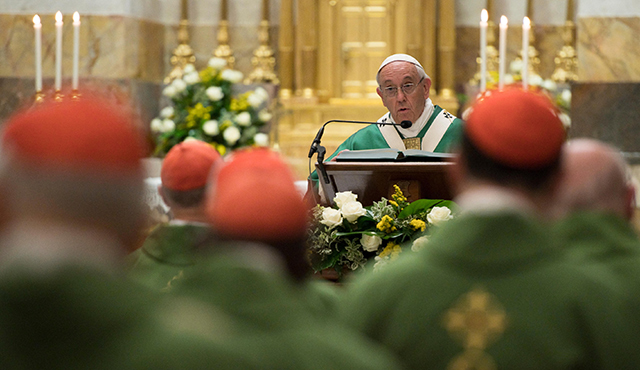I write these words from the Nuremore Hotel in Monaghan, Ireland, where I am conducting a retreat for the good priests of the Dublin Archdiocese. As I look out at these men, I am reminded of so many of my own relatives on both sides of my family (“Gosh, he looks like Uncle Charlie” and “That one is the spitting image of my cousin Terry”), for I am Irish all the way through. Many of the priests who are making the retreat are retired, and it is edifying to see so many who have bravely borne the heat of the day. Do say a prayer for them.
The theme that I have chosen for my talks is “Pope Francis Speaks to Priests.” I have culled a number of motifs from the Pope’s numerous talks, sermons, and lectures to priests, seminarians, and bishops. Allow me, in the course of this brief article to say just a few words about each one.
The first is “encountering Christ.” Drawing from the writings of Padre Luigi Giussani and others, Pope Francis emphasizes that the single most important feature of Christianity is a personal friendship with the Lord Jesus. The Christian faith is not a philosophy or a social theory or an ideology, but rather a living relationship with Jesus. Therefore, I have told the priests of Dublin, make Christ the center of your lives and let every aspect of your life and ministry revolve around your friendship with the Lord.
The second theme is “living simply.” Nothing about Pope Francis has so captivated the popular imagination than his gestures in the direction of simplicity of life: paying his own bill at the clerical residence just after his election as Pope, riding in the unpretentious Fiat rather than a limo, dining with the homeless, residing in the Santa Marta Hotel rather than the Apostolic Palace, etc. In an address to consecrated religious in 2015, the Pope cited his spiritual father Ignatius of Loyola to the effect that poverty is the “wall and the mother of the consecrated life,” mother because it gives birth to greater confidence in God and wall because it keeps out worldliness.
The third motif I am exploring is preaching, which Pope Francis emphasizes time and again when he addresses priests and seminarians. The Pope once remarked that everyone suffers from preaching, the priests from having to give sermons and the faithful from having to listen to them! In my presentation, I’m stressing that there should always be an element of the surprising and the novel in good Christian preaching, for the preacher is trading in Good News. Something utterly unexpected has happened—namely the resurrection of Jesus Christ from the dead—and the preacher wants to grab his audience by the shoulders and tell them about it. If he is simply sharing bland spiritual truisms, he is not really preaching.
Fourthly, I’m urging the priests of Dublin to be what the Pope calls “missionary disciples.” Vatican II was, first and foremost, a missionary council, whose purpose was to push the Church outward, bringing the lumen of Christ to the gentes. Paul VI, John Paul II, and Benedict XVI all followed this impulse in stressing the centrality of the new evangelization. Pope Francis has rung the same bell in his insistence that the Church must go out to the periferia, to the margins both economic and existential. He offers a funny and wise commentary on the famous scene from the book of Revelation in which Jesus stands at the door and knocks. This represents, says Francis, not so much the Lord’s desire to enter into our hearts as his longing to get out into the world!
The fifth topic is perhaps the interpretive key to the Francis papacy, namely, mercy. The Church, he has memorably commented, is like a field hospital, where those deeply wounded by our postmodern society come to be treated. Misericordia (a suffering heart) is therefore prerequisite number one for those who would aspire to serve in that treatment center. Whatever else the Church says and does, I told the Dublin presbyterate, must return to, and be conditioned by, the attitude of mercy.
Finally, I am sharing some reflections on the Pope’s encyclical letter Laudato Si. I realize that many tended to read this text as Francis’s treatise on “global warming,” and whether one celebrates or bemoans the Pope’s view on that particular topic, to read the encyclical from that perspective alone is to miss a lovely forest for one tree. What Francis accomplishes in Laudato Si is the placing of the Christian life into a properly cosmic context, and this brings him close to all of the great pre-modern figures in Christian spirituality and theology. Modernity has tended to construe the human being as, in Descartes’s famous phrase, the “master of nature,” whereas the Biblical, patristic, and medieval commentators saw the human being as stewards of creation, indeed, as the one who has the privilege and responsibility of leading all of creation in an act of praise. I have shared with the priests of Dublin the ancient notion that the priest celebrating Mass is speaking, in a sense, on behalf of the entire material creation. This explains why pre-modern Churches, such as the great Gothic Cathedrals, were decorated, inside and out, with images of plants, animals, sun, moon, stars, and planets. Curiously, an excessive anthropocentrism has actually undermined our attempts to evangelize the contemporary culture.
Again, please pray for the priests of the Archdiocese of Dublin, and indeed for all priests, as we strive to fulfill our mission.
Bishop Robert Barron is an auxiliary bishop of the Archdiocese of Los Angeles and the founder of Word on Fire Catholic Ministries.

